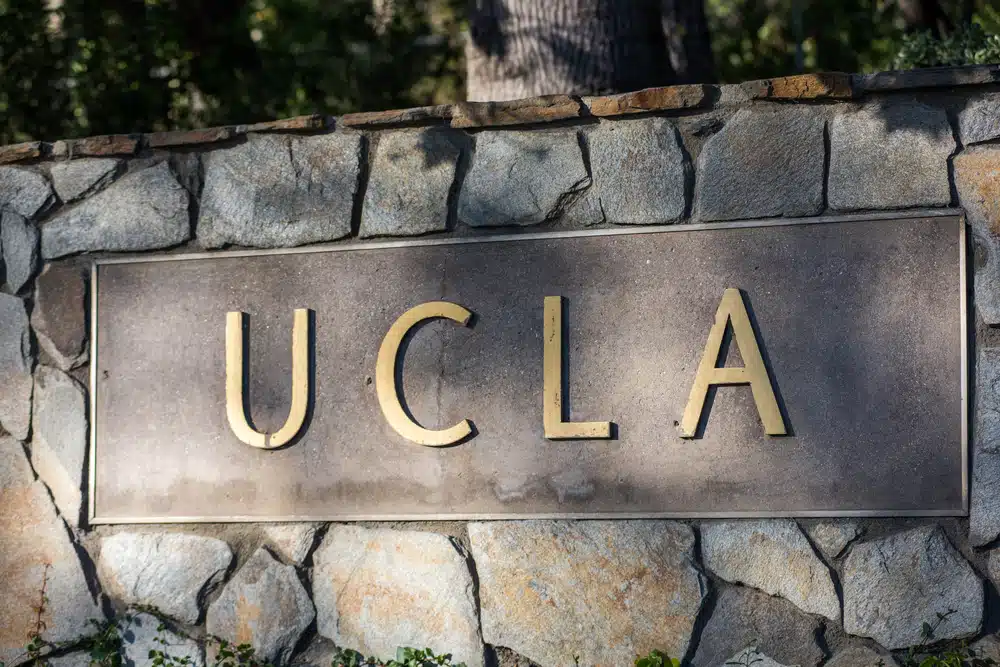How to Get into UCLA: Admission Requirements and Tips
Gaining admission to the University of California, Los Angeles (UCLA) is a dream for many high school students across the nation. Recognized globally for its prestigious academic programs, vibrant campus life, and diverse community, UCLA stands as a sought-after destination for higher education.
But the admission process at UCLA is competitive, requiring more than just stellar grades and test scores. In this post, we’re going to discuss everything you need to know before you apply to UCLA in order to give yourself the best possible chance of getting in. Let’s embark on this journey together, with each step bringing you closer to the gates of UCLA.
Overview of UCLA
The University of California, Los Angeles (UCLA) boasts a rich history that dates back to its founding in 1919. As one of the oldest campuses within the University of California system, UCLA has grown from its initial purpose of training teachers to becoming a world-renowned institution for higher education and research.
Located in the Westwood district of Los Angeles, UCLA’s campus spans a vast 419 acres, offering a dynamic blend of urban and suburban settings. Its proximity to the bustling city of Los Angeles provides students with countless cultural, professional, and recreational opportunities, enhancing their college experience.
UCLA’s reputation as a leading global university is well-earned and reflected in its rankings. In the 2024 edition of Best Colleges by U.S. News & World Report, UCLA is proudly ranked #15 among National Universities. Globally, it secured the #14 spot in the Times Higher Education World Rankings.
The university’s prestige is further underscored by its notable alumni, who have made significant contributions in various fields. Among its distinguished alumni is Glenn T. Seaborg, who was awarded The Nobel Prize in Chemistry in 1951. Another celebrated alumna is Marilyn Monroe, an icon in the entertainment industry.
Understanding UCLA’s history, prestige, and academic strengths is crucial for tailoring your application effectively. Your application should reflect an awareness of the university’s values and culture. Demonstrate how you can contribute to and benefit from UCLA’s diverse and dynamic community.
Remember, UCLA seeks students who will thrive in its environment and contribute to its legacy of excellence.
How Hard Is It to Get into UCLA?
Getting into the University of California, Los Angeles is becoming increasingly challenging. The acceptance rate at UCLA has shown a significant downward trend, starting from around 14% and decreasing to as low as 8.8%.
This trend means that UCLA is now selecting less than 9 out of every 100 applicants. This level of selectivity underscores the competitiveness of UCLA’s admissions. It’s a reflection of the high caliber of applicants UCLA attracts and the rigorous standards it maintains in selecting students who are most likely to excel in its challenging academic environment.
UCLA’s acceptance rate
The acceptance rate at the University of California, Los Angeles (UCLA) provides a clear picture of the competitive landscape of its admissions. Over recent years, UCLA’s acceptance rate has witnessed a consistent decline:
| Class | Acceptance Rate |
| Class of 2023 | 14% |
| Class of 2024 | 14% |
| Class of 2025 | 11% |
| Class of 2026 | 9% |
| Class of 2027 | 8.8% |
Particularly, for the Class of 2027, UCLA received 145,904 applications, out of which 12,779 students were admitted, resulting in an acceptance rate of 8.8%. This high level of selectivity means that UCLA is one of the most challenging universities to gain admission to in the United States.
UCLA’s acceptance rate should be interpreted as a measure of the university’s selectivity and the competitiveness of its applicant pool. It’s important to understand that a low acceptance rate implies the need for an exceptionally strong application. Use this information to set realistic expectations and to motivate yourself to put forward the best application possible.
Factors that influence the acceptance rate
Several key factors contribute to UCLA’s selectivity:
- Applicant Pool Size: Each year, UCLA attracts a large number of applications from highly qualified students, both nationally and internationally. The larger the applicant pool, the more selective the admissions process becomes.
- Academic Standards: UCLA consistently seeks students with strong academic records. High GPAs, rigorous coursework, and outstanding test scores are common among applicants, raising the bar for admissions.
- Holistic Review Process: UCLA employs a holistic review of each application. This means that beyond academics, factors like extracurricular activities, leadership experiences, and personal insight responses are crucial in the decision-making process.
- University’s Reputation and Resources: As UCLA’s reputation as a top-tier university grows, so does the attractiveness of the school to prospective students. The university’s resources, programs, and location make it a desirable choice for many, thereby increasing the number of applications and decreasing the acceptance rate.
UCLA Admission Requirements
The University of California, Los Angeles considers several key components when reviewing applications. Understanding these elements is crucial for crafting a competitive application:
- GPA: UCLA places significant emphasis on your academic performance. A high GPA is crucial, as it demonstrates your ability to excel in rigorous academic settings. While there’s no strict minimum GPA, having a strong academic record is a vital aspect of your application.
- Extracurricular Activities: Active participation in extracurricular activities is highly valued. These can include leadership roles, community service, sports, arts, and other interests. UCLA looks for students who are well-rounded and engaged in activities beyond academic pursuits.
- Personal Insight Response: These 350-word short essays are a critical component of your application. They provide an opportunity for you to convey your unique story, perspectives, and aspirations. UCLA seeks students who can express themselves clearly and compellingly through their responses.
It’s important to note that UCLA does not require or accept letters of recommendation for the general application process, nor do they collect transcripts at the point of application. Only when you get admitted are you required to submit official transcripts. Additionally, some professional schools within UCLA may request letters of recommendation as supplemental materials.
Moreover, UCLA has adopted a test-blind policy for SAT and ACT scores, which means that these scores will not be considered for admission or scholarship decisions. While you have the option to submit these test scores, they will only be utilized for purposes such as determining course placement after enrollment or fulfilling minimum eligibility requirements, not for making admission decisions.
Finally, UCLA’s admission process is holistic and comprehensive, meaning each part of your application is considered in the context of the whole. This process ensures a thorough evaluation of your academic achievements, extracurricular involvements, personal insight responses, and any additional information you provide.
UCLA GPA and SAT Requirements
As one of the most prestigious universities in the United States, UCLA places significant emphasis on academic excellence. Traditionally, this is measured by your GPA and SAT score.
Your GPA is a critical indicator of your academic performance over their high school career. It provides UCLA’s admissions committee with insight into how consistently you have performed academically and how well you have mastered the curriculum.
A high GPA suggests that you are capable of handling the rigorous coursework at UCLA and are prepared for the academic challenges you will face in college. It’s important to note that while UCLA doesn’t set a minimum GPA requirement, the average GPA of admitted students tends to be very high, reflecting the competitive nature of the admissions process.
As for SAT scores, UCLA currently operates on a test-blind policy. This means that submitting these scores is not a requirement for admission.
But high SAT scores, when submitted, might serve as supplemental information to your application. These scores may be particularly useful as an alternate means of meeting minimum eligibility criteria or determining course placement after enrollment.
For students who do not submit SAT scores, the focus on other parts of the application, like GPA, extracurricular activities, and personal insight responses, becomes even more critical. UCLA’s holistic review process ensures that students are evaluated fairly, with or without test scores.
UCLA GPA Requirements
The University of California, Los Angeles enforces a minimum GPA requirement for applicants. California residents must have a GPA of 3.0 to be eligible for admission. Nonresidents, on the other hand, must have a 3.4 GPA.
However, the latest GPA statistics for admitted students offer valuable insights into the competitiveness of UCLA’s applicant pool. The average GPA of recently admitted students is 3.93.
A typical GPA of 3.93 at UCLA is indicative of exceptionally high academic achievement. In the broader context of U.S. higher education, these figures place UCLA among the most selective universities in the country. It reflects the university’s emphasis on academic excellence and the high standards expected of its students.
It’s essential to understand that they represent a highly competitive academic environment. A GPA within this range suggests that you are among the top students academically.
However, it’s also crucial to remember that UCLA employs a holistic admissions process. This means that while a high GPA is important, it is not the sole factor in admission decisions. Your extracurricular activities, personal insight responses, and other application components are also vital.
GPA recommendations
To meet UCLA’s academic expectations, consider the following:
- Aim for a GPA of 3.93 or higher. Achieving a GPA in this range will place you competitively among other applicants.
- In addition to aiming for a high GPA, it’s also important to enroll in challenging courses. Advanced Placement (AP), International Baccalaureate (IB), and honors courses can positively impact your weighted GPA and demonstrate your ability to succeed in college-level classes.
- Consistently maintain high grades throughout your high school years. An upward trend in your GPA can be particularly favorable, especially if you had a weaker start in your high school career.
- While focusing on your GPA, don’t neglect other aspects of your application. Balance academic work with extracurricular activities and personal development, as UCLA values well-rounded students.
UCLA SAT Requirements
The University of California, Los Angeles) follows a test-blind policy for SAT scores, which means that these scores will not be considered in admission or scholarship decisions. Still, understanding past SAT statistics of admitted students could provide some context:
| Average SAT Score | 25th Percentile SAT Score | 75th Percentile SAT Score |
| 1405 | 1290 | 1510 |
Nationally, SAT scores in the range of the previously admitted UCLA students signify a high level of college readiness. These numbers give insight into what UCLA has considered competitive.
However, under UCLA’s test-blind policy, emphasis is placed more on other aspects of your application, such as GPA, extracurricular activities, personal insight responses, and unique achievements.
SAT recommendations
Given UCLA’s current admissions policy, here are some recommendations regarding SAT scores:
- Since UCLA will not consider SAT scores, you might want to reallocate the time and resources you would have spent on SAT preparation to other areas of your application.
- Direct your efforts toward strengthening your GPA, engaging in meaningful extracurricular activities, crafting compelling personal insight responses, and highlighting your unique experiences and accomplishments.
- Consider all aspects of your academic journey and how they collectively demonstrate your preparedness for a rigorous academic environment like UCLA.
- Keep informed about UCLA’s testing policies, as they may change in the future, and ensure that your application strategy aligns with their current requirements.
UCLA ACT Requirements
The University of California, Los Angeles adheres to a test-blind policy for ACT scores, meaning these scores will not be considered for admission or scholarship decisions. However, past ACT scores of admitted students might offer some context about the academic caliber of UCLA’s student body:
| Average ACT Score | 25th Percentile ACT Score | 75th Percentile ACT Score |
| 31 | 29 | 34 |
These scores are significantly above the national average and aligns with the competitive standards of selective universities like UCLA. These scores indicate a high level of academic ability and preparedness for college-level work among UCLA admits.
However, in the context of UCLA’s test-blind policy, the emphasis has shifted away from standardized test scores.
ACT recommendations
In light of UCLA’s policy, here are some recommendations regarding the ACT:
- With ACT scores no longer considered in admissions decisions, you may choose to allocate your preparation time and efforts to other areas of your application that UCLA emphasizes.
- Focus on enhancing your GPA, deepening your involvement in extracurricular activities, crafting compelling personal insight responses, and showcasing your unique talents and experiences.
- Consider how all aspects of your academic record collectively demonstrate your preparedness for UCLA’s challenging academic environment.
- Keep updated with any future changes in UCLA’s testing policies to ensure your application strategy aligns with their requirements.
Is UCLA Test-Optional?
The University of California, Los Angeles has adopted a test-blind policy for standardized tests like the SAT and ACT. Under this policy, SAT and ACT scores will not be considered for admission or scholarship decisions. This marks a significant shift from previous practices and aligns with broader changes in college admissions standards.
This test-blind policy has several implications. First, you do not need to worry about including SAT or ACT scores in your application, as they will not be used in making admission decisions.
With standardized test scores out of the equation, other parts of your application, such as your GPA, extracurricular activities, personal insight responses, and achievements, become more crucial. This allows you to highlight your strengths and experiences more comprehensively.
The policy can alleviate some of the stress and pressure associated with preparing for and taking standardized tests, enabling you to focus on other important aspects of your high school experience and application.
UCLA’s test-blind policy reflects a progressive approach to admissions, aiming to create a more inclusive and representative student body. It encourages you to present a well-rounded and authentic application, showcasing your unique abilities and aspirations.
What Does UCLA Look for in Students?
The University of California, Los Angeles seeks students who embody a diverse set of values and characteristics, aligning with the university’s commitment to excellence, diversity, and innovation. Understanding these values is crucial, as it helps tailor your application to reflect what UCLA values most.
Showcasing how you align with these values can significantly enhance your chances of admission, demonstrating that you are not just academically capable but also a good fit for UCLA’s vibrant community.
Here are some specific values and areas UCLA focuses on:
1. Academic performance
Your academic performance is a cornerstone of your application. UCLA places high value on your ability to excel in advanced coursework. Demonstrating a track record of strong academic results not only proves your intellectual capabilities but also your readiness to thrive in UCLA’s demanding academic environment.
2. Personal qualities
Your character traits play a significant role in your application. UCLA is on the lookout for students who exhibit resilience, leadership, empathy, creativity, and other qualities indicative of a well-rounded individual. These traits suggest that you have the potential to positively impact both the campus community and the broader world.
3. Potential contributions to UCLA’s culture and intellectual community
Your ability to contribute to UCLA’s vibrant intellectual and cultural life is crucial. Whether through your unique perspectives, diverse experiences, or a zeal for learning and innovation, showing how you can enrich the campus environment is key. UCLA values students who bring new ideas and viewpoints, fostering a rich learning atmosphere.
4. Achievement in academic enrichment programs
Active participation and success in academic enrichment programs signal your dedication to extending your learning beyond the traditional classroom. This can be particularly impactful if these programs align with your intended area of study, showcasing your commitment and depth of interest in your chosen field.
5. Success in extracurricular activities
UCLA recognizes the value of accomplishments across a broad spectrum of areas, including the performing arts, athletics, community service, and other intellectual or creative endeavors. Such achievements demonstrate a well-rounded character, underscoring your potential to offer unique contributions to the university community.
In summary, by understanding and reflecting these values in your application, you can present yourself as a well-rounded, dynamic candidate who not only meets UCLA’s academic standards but also enriches its diverse and vibrant community.
UCLA Application Tips
Navigating the application process for the University of California, Los Angeles can be challenging, but with the right approach and preparation, you can significantly enhance your application.
This section aims to provide you with targeted tips and strategies that align with UCLA’s values and what they look for in prospective students. By adhering to these suggestions, you’ll be better positioned to create an application that resonates with UCLA’s admissions committee and highlights your potential as a future Bruin.
1. Excel in your academics.
Excelling in your academics is crucial when applying to UCLA. Your academic performance, reflected primarily through your GPA and the rigor of your courses, is a fundamental indicator of your ability to succeed in a challenging university environment.
UCLA seeks students who have not only achieved high grades but who have also challenged themselves with advanced coursework. Excelling academically demonstrates your dedication, intellectual curiosity, and readiness for the rigorous academic life at UCLA.
Specific tips:
- Challenge yourself with rigorous courses. Enroll in advanced courses like AP, IB, or honors classes if they are available. Excelling in these challenging courses shows UCLA that you are prepared for the academic rigor of college-level work. However, be mindful to balance the difficulty of your courses with your ability to maintain strong grades.
- Aim for consistency and improvement. Strive for consistently good grades throughout your high school years. If you have any lower grades, an upward trend in later years can demonstrate your growth and resilience. UCLA values improvement and the ability to overcome academic challenges.
- Seek help when needed. If you’re struggling in a subject, don’t hesitate to seek extra help. This could be through tutoring, study groups, or additional practice. Seeking help when needed shows your commitment to learning and your willingness to take initiative for your academic growth.
2. Join academic enrichment programs.
Participating in academic enrichment programs is a vital aspect of strengthening your UCLA application. These programs, which can include summer schools, research projects, specialized workshops, or academic competitions, demonstrate your commitment to furthering your education beyond the classroom.
Academic enrichment programs provide an opportunity for you to explore your academic interests in greater depth, show initiative, and develop a deeper understanding of your chosen field. For UCLA, your involvement in these programs indicates a passion for learning and a proactive approach to your academic and personal development.
Specific tips:
- Select programs aligned with your interests. Choose enrichment programs that align with your academic interests or intended major. This alignment shows a deliberate effort to deepen your understanding and skills in areas that matter to you.
- Seek diverse learning opportunities. Don’t limit yourself to one type of program. Explore different formats, such as online courses, university-sponsored summer schools, or local community workshops. This diversity of experiences can broaden your perspective and enhance your learning.
- Showcase your achievements and learnings. When you discuss these programs in your application, focus not just on participation but also on what you learned and how it contributed to your academic and personal growth. If you completed a significant project or received any recognition, be sure to mention it.
3. Pursue meaningful extracurricular activities.
Engaging in meaningful extracurricular activities is a crucial aspect of your UCLA application. UCLA values students who demonstrate passion, leadership, and commitment outside the classroom. Your involvement in extracurriculars can reveal a lot about your interests, skills, and character.
These activities provide a platform for you to showcase your talents, leadership abilities, and commitment to your interests, whether they are in sports, arts, community service, or other areas.
Specific tips:
- Pursue your passion. Engage in extracurricular activities that genuinely interest you and align with your goals or passions. Authentic involvement is more valuable than a long list of disconnected activities. UCLA will be able to tell if you’re truly passionate about the activities you’re involved in.
- Demonstrate leadership and initiative. Take on leadership roles in your activities. Whether you’re a club president, a team captain, or an organizer of a community event, these roles demonstrate your ability to lead, organize, and influence others positively.
- Show long-term commitment and impact. Consistent involvement in activities over a longer period is more impressive than short-term participation. It shows dedication and commitment. Also, highlight any significant impact or contributions you’ve made through these activities, such as organizing a successful event or initiating a community service project.
- Explore a range of activities. While it’s important to be committed, don’t hesitate to explore a variety of activities. This diversity can show your willingness to try new things and your ability to balance multiple interests and responsibilities.
4. Write compelling personal insight responses.
Your responses to the Personal Insight Questions are a vital part of your UCLA application. They provide a unique opportunity to present your authentic voice, perspectives, and experiences, offering insights into your personality and motivations beyond what grades and test scores reveal.
These questions are your chance to augment the information in your application and help the admissions committee understand you better.
Specific tips:
- Start early and reflect deeply. Begin working on your responses well in advance. This early start gives you ample time to reflect on the most relevant questions to your experiences and how best to articulate your thoughts.
- Choose relevant questions. Out of the eight available questions, select the four that resonate most with your experiences and best reflect your individual circumstances. These should be questions where you can offer meaningful and authentic insights into who you are.
- Showcase your individuality. Use your responses to share unique aspects of your life, including specific anecdotes and experiences. Be genuine and honest in your storytelling, ensuring your true self comes through in your writing.
- Write clearly. Present your thoughts clearly and coherently. Organize your responses with a logical flow, making them engaging and easy to follow. Pay attention to grammar and syntax to maintain readability and impact.
- Align with UCLA’s values. In your responses, subtly align with the qualities and values sought by UCLA. Discuss how your experiences have shaped you and how they contribute to your readiness for the academic and social environment at UCLA, as well as your potential contributions to the campus community.
5. Prepare early.
Early preparation is crucial for a successful UCLA application. Starting well in advance allows you to thoughtfully craft each component of your application.
Early preparation also helps reduce stress and provides ample time for refining your application, ensuring that it accurately reflects your achievements, skills, and potential. By preparing early, you can ensure that your application is comprehensive, cohesive, and presents the best possible representation of yourself to the admissions committee.
Specific tips:
- Understand UCLA’s requirements. Familiarize yourself with all aspects of UCLA’s application process, including deadlines, required documents, and any specific criteria they have. This understanding will help you plan effectively and avoid last-minute rushes.
- Develop a timeline. Create a timeline for your application process. Include key dates such as deadlines for standardized tests (if you choose to take them), application submission deadlines, and dates by which you need to complete certain parts of your application, like gathering any required documents.
- Seek feedback on your application. Teachers, counselors, or mentors can provide valuable insights and suggestions for improvement. Remember to leave enough time to incorporate this feedback before submission.
- Regularly review and refine your application. Periodically review your application materials to ensure they align with UCLA’s values and expectations. This ongoing refinement process allows you to continually improve your application and address any areas that may need more attention.
Subjects to Take to Get into UCLA
UCLA requires the completion of 15 A-G courses, with at least 11 of these courses finished before your final year of high school. However, merely meeting these minimum requirements may not be sufficient for a competitive application. UCLA expects applicants to present an academic profile that goes beyond these minimum standards.
The A-G requirements include:
- 2 years of history/social science
- 4 years of college-preparatory English
- 3 years of mathematics (4 years recommended)
- 2 years of laboratory science (3 years recommended)
- 2 years of a language other than English (3 years recommended)
- 1 year of visual and performing arts (if available)
- 1 year of a college-preparatory elective
It’s important to note that while these are the baseline requirements, competitive applicants often exceed them, especially in areas related to their intended field of study.
Subject recommendations
To enhance your chances of admission to UCLA, it’s important to understand and meet the specific subject requirements set by the university. Here are some tips:
- Aim to enroll in advanced courses such as AP, IB, or honors classes within the A-G subject areas. This demonstrates your ability to handle challenging academic material.
- While it’s important to meet all the A-G requirements, also focus on subjects where you excel or have a strong interest, especially if they align with your intended major or career path.
- Whenever possible, exceed the minimum requirements. For example, if UCLA recommends four years of math, aim to complete four years, particularly if math is a strong subject for you or relevant to your future studies.
- If available, take a year of visual and performing arts. This not only fulfills the A-G requirement but also shows your well-roundedness and exposure to diverse fields of study.
- Select college-preparatory electives that enhance your academic profile and align with your interests and goals. This could include additional courses in areas like computer science, advanced sciences, or other subjects that offer depth to your education.
- UCLA reviews each application within the context of courses available at your school. If certain subjects are not offered, focus on excelling in the subjects that are available and communicate any limitations in your application.
By strategically selecting and excelling in these subject areas, you can strengthen your academic profile and demonstrate your readiness for the academic rigor and diverse learning environment at UCLA.
Specific Areas that Can Boost Your UCLA Application
Navigating the competitive landscape of UCLA admissions requires more than just meeting the basic application criteria. Focusing on specific areas that can significantly enhance your academic and extracurricular profile is key to standing out in a pool of highly qualified candidates.
Research
Engaging in research projects showcases your ability to undertake in-depth study and contribute to knowledge in your field of interest.
- Simons Summer Research Program: This program allows high school students to engage in hands-on research under the guidance of experienced scientists and researchers. Participation demonstrates your ability to conduct advanced, independent research, an appealing trait for a prospective UCLA student.
- Research Science Institute (RSI) at MIT: RSI offers students the opportunity to conduct original, cutting-edge research in science, engineering, and mathematics. Completing a program of this caliber can significantly strengthen your application by showcasing your research skills and scientific curiosity.
Competitions
Participating in academic competitions demonstrates your proficiency and ambition in specific subjects.
- Intel International Science and Engineering Fair (ISEF): Participating in ISEF, one of the most prestigious science research competitions for high school students, showcases your dedication and expertise in scientific inquiry and innovation.
- American Mathematics Competitions (AMC): Excelling in AMC can demonstrate your advanced mathematical skills and problem-solving abilities, highly regarded by UCLA.
Summer programs
Attending summer programs indicates your commitment to furthering your education and exploring academic interests beyond the regular school curriculum.
- UCLA Summer Sessions: UCLA’s own summer sessions offer high school students the opportunity to experience college life and study in a university setting. Participating in these programs showcases your eagerness to engage with advanced academic content and adapt to a collegiate environment.
- Stanford University Mathematics Camp (SUMaC): SUMaC offers an intensive summer program for students passionate about advanced mathematics. Excelling in such a program highlights your commitment and ability in mathematics.
Internships
Securing internships in your field of interest provides practical experience and reflects your readiness for real-world challenges.
- NASA High School Internship: An internship at NASA allows you to work on real-world projects in science and engineering, showing your ability to apply classroom knowledge in a professional setting.
- Google Computer Science Summer Institute (CSSI): CSSI is an excellent opportunity for aspiring computer scientists to develop their skills. Participation demonstrates both your technical abilities and your initiative in pursuing relevant professional experiences.
Arts
Involvement in the arts exhibits your creativity and dedication to cultural and artistic endeavors.
- National YoungArts Foundation: Participating in YoungArts can showcase your artistic talents and dedication, whether in visual arts, literature, or performing arts.
- Interlochen Arts Camp: A summer program at Interlochen offers intensive training in various art forms and can significantly enhance your artistic profile.
Sports
Active participation in sports showcases your teamwork, discipline, and commitment to physical excellence.
- AAU Junior Olympic Games: Competing in the AAU Junior Olympic Games demonstrates your athletic skills and commitment to sports at a high level.
- Elite Sports Camps and Clinics: Participating in elite sports camps or clinics, especially those hosted by well-known universities or organizations, can highlight your sportsmanship and dedication to athletic excellence.
School clubs
Leadership or active participation in school clubs highlights your organizational skills and engagement in school community initiatives.
- Model United Nations (MUN): Active involvement in MUN showcases your leadership, public speaking, and global awareness—qualities valued by UCLA.
- Science Olympiad or Robotics Club: Leading or actively participating in these clubs demonstrates your team-building skills, technical knowledge, and commitment to scientific exploration.
Community service
Dedication to community service demonstrates your civic responsibility and compassion for societal betterment.
- Key Club or Rotaract: Involvement in these service organizations reflects your commitment to community service and leadership abilities.
- Local Nonprofit Volunteer Programs: Consistently volunteering with a local nonprofit shows your dedication to community improvement and can provide a unique perspective to your application.
Participating in these academic and extracurricular activities can significantly boost your UCLA application, showcasing a well-rounded, dedicated, and capable individual ready to thrive in UCLA’s dynamic environment.
UCLA Application Requirements
When applying to UCLA, understanding and meticulously adhering to the mandatory, optional, and other specific requirements is key to a successful application. Here’s a detailed breakdown of these requirements with helpful tips for each.
Mandatory requirements
- UC Application Submission: Complete your application through the UC Application website. Ensure you accurately fill out all sections and meet the submission deadlines. Review the application thoroughly before submitting to avoid errors and omissions.
- Transcripts: While you shouldn’t submit your transcripts at this stage, use them as a reference when filling out your application to ensure accuracy. Double-check the coursework and grades you enter against your transcripts to maintain consistency and accuracy.
- Application Fee or Waiver: The application fee is $80 for each UC campus you apply to. Fee waivers are available for eligible students. If you’re facing financial hardship, explore the fee waiver option and apply early to ensure eligibility and processing.
- Personal Insight Questions: Respond to four out of eight personal insight questions, with each response limited to a maximum of 350 words. These questions allow you to share more about your personal experiences and perspectives. Choose questions that best reflect your individual circumstances and experiences, and use specific examples to illustrate your points.
Optional requirements
- Standardized Testing (SAT/ACT): UCLA is test-blind, but if you choose to submit SAT/ACT scores, they may be used for course placement or fulfilling minimum requirements after enrollment. Consider submitting your scores if you feel they accurately represent your academic abilities and could benefit your course placement.
Other requirements
- Supplemental Applications for Specific Majors: Some majors, especially in specialty schools, require supplemental applications, which may include auditions, portfolio submissions, or letters of recommendation. Check the specific requirements for your intended major and prepare any additional materials well in advance.
Remember, UCLA does not require letters of recommendation for the general undergraduate application and does not offer admission interviews. Focusing on the requirements above ensures a comprehensive and targeted approach to your UCLA application.
How to Apply to UCLA
Applying to the University of California, Los Angeles involves a detailed and structured process. From initial preparation to awaiting results, each step is crucial to ensure a strong and complete application.
1. Preparation
Begin by researching UCLA’s course offerings, campus life, and specific requirements for your desired major. Familiarize yourself with the UC Application portal and the various components of the UCLA application, including Personal Insight Questions and any supplemental materials needed for your major.
Start this phase at least a year before your intended start date to give yourself ample time for thorough preparation.
2. Application completion
Carefully complete the UC Application, ensuring all sections are accurately filled. Pay particular attention to the Personal Insight Questions, selecting the ones that best showcase your experiences and aspirations.
Do not submit transcripts or letters of recommendation unless specifically requested for your major.
Regularly save your progress and review each section for accuracy and completeness.
3. Submission
After thoroughly reviewing your application, submit it through the UC Application portal. Pay the required application fees, or apply for a fee waiver if eligible. Aim to submit your application well before the deadline to avoid last-minute technical issues.
4. Post-submission
Once your application is submitted, focus on maintaining strong academic performance and staying engaged in extracurricular activities. If you have applied for financial aid, ensure all necessary documents are submitted.
Keep an eye on your email and the application portal for any communications from UCLA.
5. Awaiting results
After submitting your application, the waiting period begins. Results are typically released in late March for freshman applicants. During this time, avoid the temptation to incessantly check the portal; instead, use this period to explore other interests or backup options.
Be prepared for any outcome and remember that your self-worth is not determined by an admission decision.
How to Submit Supplemental Materials to UCLA
UCLA has specific guidelines and procedures for submitting supplemental materials as part of the admission process. These procedures vary depending on the program and whether you are applying for undergraduate or graduate studies.
For undergraduate admissions, UCLA requires supplemental materials for certain professional school majors. These materials need to be submitted directly to the department concerned. It’s important to note that these supplemental materials should only be submitted if you have selected the program as your primary major at UCLA.
Additionally, for international students, there are extra requirements like a Confidential Financial Statement and English proficiency tests like TOEFL or IELTS.
Submission methods
The submission of supplemental materials is primarily done online. For undergraduate programs, you must submit these materials directly to the department you’re applying to. Each department has its own portal or method for submission.
Step-by-step guide
- Check the specific requirements for the program you are applying to. This information is available on the department’s website or the UCLA admissions page.
- Gather all the necessary documents such as personal statements, portfolios, letters of recommendation, etc. Ensure they meet the specified criteria for your program.
- For undergraduate programs, submit your materials directly to the department.
- Ensure that you submit all materials before the deadline. Deadlines vary based on the program and department.
- If you’re an international student, make sure to fulfill any additional requirements like financial statements and English proficiency tests.
- After submission, keep an eye out for any confirmation emails or notifications from UCLA to ensure your application is complete.
UCLA Scholarships and Financial Aid
UCLA offers a variety of financial aid options to support its students, including scholarships, grants, loans, and part-time employment opportunities.
Scholarships
UCLA provides financial support that may be awarded based on need, academic merit, background, specific talents, or professional interests. Key scholarships include UCLA Regents Scholarships and UCLA Alumni Scholarships, both merit-based, and University Student Aid Program Funds, which are need-based.
The UCLA Scholarship Resource Center is a unique facility for current students, offering services like counseling and workshops to help identify available scholarships, regardless of income level.
Grants
Grants are awarded based on need and do not have to be repaid. This includes federal and state government grants, as well as UCLA-specific grants like the University of California Blue and Gold Opportunity Plan and the Cal Grants, available only to California residents.
For all U.S. residents, options include federal Pell Grants and Supplemental Educational Opportunity Grants, along with need-based University Grants from UCLA.
Loans
UCLA offers a variety of low-interest federal and private loans for students and parents. Federal loans have terms set by the Department of Education and offer flexible payment options, with repayment potentially delayed until after graduation.
Part-time student jobs
Over 9,500 UCLA undergraduates worked on campus part-time last year. Work-study awards can make it easier to find a position, on campus or off, and working at UCLA qualifies students for various employee discounts.
UCLA Decision Options
UCLA does not offer an Early Action or Early Decision admissions process. Instead, the university employs Regular Decision only.
The absence of Early Action or Early Decision at UCLA is a deliberate choice, ensuring that all applicants are considered equally and based on a wide range of criteria, not just academic performance.
UCLA Application Deadline
For undergraduate admissions, UCLA follows this specific timeline:
- Regular Decision Application Deadline: November 30th.
- Admission Decisions Announcement: Typically, in late March or early April.
- Confirmation of Enrollment: Accepted students have until May 1st to confirm their intent to enroll.
This timeline allows UCLA’s admissions team to conduct a thorough and holistic review of each application.
How Hard is It to Get into UCLA?
Gaining admission to the University of California, Los Angeles (UCLA) can be challenging due to its high academic standards and the large number of applicants each year. UCLA is one of the most sought-after universities in the United States, and its popularity continues to grow. The acceptance rate, which indicates the percentage of applicants who are offered admission, is a critical figure to consider. Historically, UCLA’s acceptance rate has been quite low, often falling below 10%. This low acceptance rate is a clear indicator of the university’s selectiveness.
Several factors contribute to the difficulty of gaining admission to UCLA. Firstly, the academic performance of applicants is a significant consideration. UCLA typically looks for students with strong high school GPAs, particularly those who are in the top 10% of their class. Additionally, standardized test scores, such as the SAT or ACT, play a role in the admissions process, though their importance has been evolving in recent years.
Apart from academic achievements, UCLA also values a well-rounded student body. This means that extracurricular activities, leadership experiences, community service, and personal essays are crucial components of the application. These factors allow the admissions committee to gauge an applicant’s character, interests, and potential contribution to the university community.
In summary, gaining admission to UCLA is challenging due to its low acceptance rate and high standards for academic and personal achievements. Prospective students need to demonstrate not only exceptional academic abilities but also a strong character and involvement in activities outside of academics.
Benefits of Attending UCLA
Attending the University of California, Los Angeles (UCLA) offers a multitude of benefits, making it a desirable choice for many students. Here are some of the key advantages:
- Academic Excellence: UCLA is renowned for its high-quality education and is consistently ranked among the top universities in the world. It offers a wide range of undergraduate and graduate programs across various fields, ensuring that students have access to diverse and comprehensive academic opportunities.
- Research Opportunities: As a leading research university, UCLA provides students with the chance to engage in cutting-edge research. This is a significant advantage for those interested in pursuing careers in research, academia, or industries that value innovation and scientific inquiry.
- Diverse Community: The university boasts a diverse and inclusive community, providing a rich cultural and social experience. Students from all over the world come to UCLA, offering a unique opportunity to learn from and interact with people from a wide array of backgrounds.
- Networking and Career Opportunities: UCLA’s strong reputation and its location in Los Angeles open up numerous networking and career opportunities. The university’s alumni network is extensive and influential, which can be beneficial for job placements and career advancement.
- Campus Life and Resources: UCLA offers a vibrant campus life with a plethora of student organizations, sports teams, and cultural activities. Additionally, the university provides various resources to support student well-being, including health services, counseling, and academic support.
Attending UCLA means more than just receiving a top-tier education; it’s about becoming part of a community that values diversity, innovation, and personal growth.
How Can an International Student Get into UCLA?
As an international student aspiring to join the University of California, Los Angeles (UCLA), understanding the specific admission requirements is crucial for a successful application. UCLA, known for its prestigious programs and diverse student body, offers opportunities for both freshman and transfer students from around the globe. Here’s an insightful guide on managing the admission process for international students.
Academic Requirements for Freshmen and Transfer Students
Freshman Applicants: You qualify as a freshman applicant if you’ve completed secondary school and have not enrolled in a regular session at any college or university. It’s important to note that UCLA does not accept students who already hold Bachelor’s degrees or have completed the equivalent of three years of transferable university work. Your entire academic record, including all college coursework, is considered during the admissions process.
Transfer Students: As a transfer student, you need to be at the junior level, meaning you should have completed college-level coursework amounting to 90-130 quarter (60-90 semester) units of credit. International students, even those attending California community colleges, are considered for admission, though UCLA typically gives preference to students transferring from California community colleges.
Education System and Language Requirements
Your educational background in your home country plays a significant role. Depending on your country’s education system, you might have additional admission requirements. For language proficiency, if your high school education was not in English, you’ll need to demonstrate your English skills. Acceptable tests include the TOEFL, IELTS, or the Duolingo English Test, with UCLA looking for scores above 100 in TOEFL (with sub-scores above 22), 7 or above in IELTS, or 120 or higher in the Duolingo English Test.
Financial Information and Health Insurance
It’s crucial to understand that UCLA does not provide financial aid or scholarships to international undergraduates. You must show proof of sufficient funds to cover educational and living expenses. For instance, for the Fall Quarter 2022, students needed a minimum of about $68,474. Additionally, international students on non-immigrant visas must have adequate medical insurance during their enrollment.
Transcripts and Official Records
UCLA requires academic records from secondary schools, showing subjects taken and grades received, along with any national or government certificates earned. College or university coursework records are also necessary, in the original language, accompanied by English translations. It’s important not to send these documents unless you’re admitted and instructed to do so.
How to Get into UCLA as a Transfer Student?
Gaining admission to UCLA as a transfer student involves a different set of criteria and steps compared to first-time freshmen. Here’s a guide to help prospective transfer students.
Excelling in Academic Credentials
UCLA places significant emphasis on academic preparation and performance. As a transfer student, you need to demonstrate strong academic credentials. The average GPA of admitted transfer students typically exceeds 3.5, and these students have usually completed most or all major preparatory courses. Notably, UCLA gives the highest priority to applicants from California community colleges and other UC campuses, and admissions are for the fall quarter only.
Key criteria for academic preparation include:
- Junior-level Standing: Having completed 60 semester or 90 quarter transferable units by the end of the spring term before transfer.
- Minimum GPA: A GPA of 3.2 or higher in transferable courses.
- Course Requirements: Completion of specific courses by spring before transfer, including two transferable courses in English composition or critical thinking and writing, one transferable math course with a prerequisite of intermediate algebra or higher, and four transferable college courses in at least two subject areas (arts and humanities, social and behavioral sciences, physical and biological sciences).
- Major Preparation: Progress toward completion of major preparation requirements by spring before transfer.
Personal Achievements and Challenges
UCLA also considers personal criteria in its comprehensive review process. This includes factors like employment during school, involvement in campus organizations and community service, family responsibilities, military service, and other unique challenges or opportunities that have shaped your educational experiences.
Crafting Compelling Personal Insight Responses
The personal insight questions offer an opportunity to augment your application with more personal details. As a transfer applicant, you’ll respond to one required question and three out of seven additional questions. These responses provide UCLA with deeper insights into your personality and background.
Academic Planning for Transfer
Prospective transfer students are advised to take required English and math courses as early as possible. Being competitive for admission involves completing general UC transfer requirements and major preparation first. California community college students should consider the Intersegmental General Education Transfer Curriculum (IGETC), which is not a requirement but is recommended for applicants to most UCLA schools except the Samueli School of Engineering.
Major-Specific Preparation Strategies
For your major, complete the preparation requirements by the end of spring before transfer. If applying to highly selective majors like business economics, economics, or psychology, aim to complete all major prep by the end of fall before transfer.
Mastering the UCLA Application Process
When filling out your UCLA application, ensure that all courses are reported accurately, including non-transferable ones. Regularly check your email for updates and provide your fall grades and planned spring coursework in your Transfer Academic Update (TAU) by January 31.
Gaining admission to UCLA as a transfer student is challenging but achievable with proper preparation and understanding of the requirements. Focus on maintaining a strong GPA, completing requisite courses, engaging in meaningful extracurricular activities, and providing insightful responses to the personal insight questions. With careful planning and a commitment to academic excellence, your goal of transferring to UCLA can become a reality.
Can an Average Student Get into UCLA?
Gaining admission to the University of California, Los Angeles (UCLA) is a goal for many students. However, the question arises: can an average student get into UCLA? The answer is nuanced and requires an understanding of what UCLA looks for in its applicants.
UCLA is known for its competitive admissions process. In recent years, the acceptance rate has hovered around 10%, which means that only about 10 out of every 100 applicants are admitted. This statistic alone can be intimidating, but it’s important to remember that admissions decisions are based on a variety of factors, not just academic performance.
The term “average student” is subjective. At UCLA, the admitted students often have strong academic records, with high GPAs and standardized test scores. However, UCLA also values a holistic approach in its admissions process. This means that in addition to academic achievements, the admissions committee considers other aspects such as extracurricular activities, leadership roles, personal essays, and letters of recommendation. These components allow students to showcase their unique talents, experiences, and potential contributions to the UCLA community.
For an average student, it’s essential to focus on these holistic elements. Showcasing your passion, commitment to community service, leadership skills, or unique talents can significantly enhance your application. It’s also important to write compelling personal essays that offer a glimpse into who you are beyond your grades and test scores.
In summary, while academic excellence is a significant factor in UCLA’s admissions process, it is not the sole determinant. An average student with a strong application in other areas may still have a chance at admission.
How to Get into UCLA with a Low GPA?
Getting into UCLA with a low GPA can be challenging, but it’s not impossible. It requires a strategic approach and an emphasis on other aspects of your application.
Highlight Your Strengths
If your GPA isn’t your strongest point, focus on areas where you excel. This could include extracurricular activities, sports, arts, volunteer work, or any unique experiences that have shaped you.
Strong Essays
Your personal essays are a crucial part of your application. Use them to tell your story, explain any challenges you’ve faced, and demonstrate your growth and resilience. Your essays can provide context to your GPA and showcase your personality and potential.
Letters of Recommendation
Secure strong letters of recommendation from teachers, counselors, or mentors who know you well and can speak to your strengths and potential.
Standardized Test Scores
If UCLA requires standardized test scores, aim to score well. High test scores can sometimes offset a lower GPA.
Academic Improvement
If there’s an upward trend in your grades over the years, make sure it’s noticeable in your transcript. This can demonstrate your ability to overcome challenges and improve academically.
Supplemental Information
If there are legitimate reasons for your low GPA, such as personal or family issues, explain them in the additional information section of your application.
Remember, UCLA’s holistic review process means that every part of your application is important. A low GPA does not automatically disqualify you, especially if other aspects of your application are strong.
What Makes UCLA Unique?
UCLA stands out for several reasons, making it a highly sought-after university:
- Academic Excellence: UCLA offers a diverse range of programs with a strong emphasis on research and innovation. Its faculty includes Nobel laureates, and the university is regularly ranked among the top institutions globally.
- Diverse Student Body: UCLA’s student body is incredibly diverse, both culturally and geographically. This diversity enriches the educational experience, as students are exposed to a wide range of perspectives.
- Location: Situated in Los Angeles, UCLA offers students a vibrant city experience, with access to internships, entertainment, cultural events, and outdoor activities.
- Athletics: UCLA has a rich athletic history and is known for its successful sports teams. This creates a spirited community and offers opportunities for student athletes.
- Alumni Network: UCLA’s extensive alumni network provides students with valuable connections and opportunities in various industries after graduation.
What Does the UCLA Application Look Like?
The UCLA application is comprehensive and designed to capture a holistic view of each applicant. Here’s what it generally includes:
- Personal Information: Basic information about the applicant, including contact details, family background, and residency status.
- Academic History: Details about your high school education, courses taken, grades, and standardized test scores (if required).
- Activities and Awards: This section allows you to list your extracurricular activities, leadership roles, honors, and awards.
- Personal Insight Questions: UCLA requires applicants to answer several short essay questions. These questions are designed to learn more about your experiences, interests, and personal perspective.
The UCLA application is part of the University of California (UC) application system, so it’s standardized across all UC campuses. This means that while you can apply to multiple UC campuses, the core application remains the same.
In conclusion, getting into UCLA requires more than just good grades. It’s about presenting a well-rounded, compelling application that highlights your strengths, passions, and potential contributions to the UCLA community.
Is UCLA a Good School for You?
When considering the suitability of UCLA (University of California, Los Angeles) as a choice for your higher education, there are several factors to consider. As one of the most prestigious universities in the United States, UCLA offers a diverse array of programs and opportunities. However, determining if it’s the right fit for you involves looking beyond its reputation.
Academic Programs
UCLA is renowned for its wide range of strong academic programs. Whether you’re interested in the arts, sciences, engineering, or humanities, you’ll find a program that excels in your area of interest. It’s important to research the specific department you’re interested in, as some are more renowned than others.
Campus Life and Culture
The environment at UCLA is vibrant and diverse, with a myriad of student organizations, extracurricular activities, and a strong sense of community. This dynamic atmosphere is ideal for students who thrive in a bustling environment and are looking for a comprehensive college experience.
Location
Situated in Los Angeles, UCLA offers the advantages of being in a major city. This includes access to numerous internships, job opportunities, and cultural experiences. However, for those who prefer a quieter, more rural setting, this might be a drawback.
Financial Considerations
As a public university, UCLA offers a more affordable education compared to many private institutions, especially for California residents. However, out-of-state and international students will face higher tuition fees.
UCLA could be an excellent choice if its programs align with your academic interests, you thrive in a lively and diverse environment, and it fits your financial situation. It’s crucial to reflect on what you want from your college experience before making a decision.
How Selective is UCLA?
UCLA is known for its high level of selectivity. As one of the most sought-after universities in the nation, it has a low acceptance rate, meaning that a small percentage of applicants are admitted each year. This selectivity is a testament to the university’s academic rigor and prestige.
The acceptance rate varies each year, but it has historically been below 10%. For example, the Fall 2023 acceptance rate was 9%.This rate is even more competitive for certain programs or departments. Factors that influence acceptance include academic achievements, extracurricular involvement, personal essays, and letters of recommendation.
UCLA’s selectivity indicates that the admissions process is highly competitive. Applicants should ensure that their academic records, test scores, and other application components are strong. However, it’s also important to remember that UCLA looks for well-rounded individuals who contribute to a diverse and dynamic student body.
Should You Apply to UCLA?
Deciding whether to apply to UCLA requires careful consideration. Given its high selectivity, applicants should assess their qualifications realistically. If your academic record and test scores align with those typically admitted to UCLA, it could be a great option to include in your college application list.
However, applying to UCLA, or any highly selective university, should be part of a broader strategy. It’s wise to have a mix of “reach,” “match,” and “safety” schools in your application list. UCLA might be a “reach” for many students due to its competitiveness.
Also, consider what you want from your college experience. UCLA offers exceptional academic programs, a vibrant campus life, and a location in a major urban center. If these aspects align with your preferences and goals, UCLA might be a good fit for you.
How Does UCLA Review Applications?
UCLA employs a comprehensive review process for applications. This means that they consider a wide range of factors, not just academic metrics like GPA and test scores. The university aims to understand the whole person behind each application.
- Academic Achievement: This includes GPA, the rigor of your high school curriculum, and standardized test scores. UCLA looks for students who have excelled academically and taken challenging courses relative to what is available in their school.
- Personal Insight Questions: UCLA’s application includes questions that allow you to share more about your life experiences, challenges, and achievements. These responses give the admissions committee a glimpse into your personality, character, and potential to contribute to the UCLA community.
- Extracurricular Activities: The university values applicants who have been involved in activities outside of the classroom, such as clubs, sports, volunteering, and work experiences. These activities demonstrate leadership, commitment, and the ability to balance various responsibilities.
- Additional Factors: UCLA also considers other elements like geographic location, first-generation college status, and life challenges. These factors help the admissions team understand your background and how you might bring diversity to the campus.
UCLA’s application review process is thorough and holistic. They seek students who are academically capable and bring unique perspectives and experiences to the university community. Preparing a well-rounded application that showcases your academic achievements, personal qualities, and extracurricular involvement is crucial.
Does UCLA Require Interviews?
When considering your application to the University of California, Los Angeles (UCLA), you may wonder if an interview is part of the admissions process. The answer is quite straightforward: UCLA does not typically require interviews for undergraduate admissions. This means that your admission decision will primarily be based on your application materials, such as your academic record, personal statements, and letters of recommendation.
However, it’s important to note that for certain specialized programs or scholarships, an interview may be required. In such cases, UCLA will notify you if an interview is necessary. Generally, for the vast majority of applicants, the admissions process is conducted without any interviews.
What Extracurriculars Do You Need for UCLA?
UCLA looks for students who are academically strong and actively involved in their communities. While there is no specific list of required extracurricular activities, involvement in certain types of activities can strengthen your application. These include:
- Leadership Roles: Holding leadership positions in clubs, sports teams, or other organizations demonstrates your ability to manage responsibilities and work with others.
- Community Service: Volunteering in your community shows a commitment to helping others and contributing positively to society.
- Creative Pursuits: Involvement in the arts, music, writing, or other creative activities can showcase your talents and passions.
- Athletics: Participation in sports can display teamwork, dedication, and discipline.
- Academic Competitions: Success in academic competitions can highlight your intellectual curiosity and mastery of certain subjects.
Remember, quality is more important than quantity. UCLA values deep and sustained involvement in a few activities over superficial participation in many.
What Should You Write About in Your Personal Statement to Get Into UCLA?
Your personal statement is a crucial component of your UCLA application. It’s your opportunity to show the admissions committee who you are beyond your grades and test scores. Here are some tips on what to write about:
- Your Background and Experiences: Share your unique story. How have your family, culture, and experiences shaped who you are?
- Challenges and Overcoming Them: Discuss any challenges you’ve faced and how you’ve overcome them. This can demonstrate resilience, determination, and growth.
- Academic Interests: Explain why you are passionate about your chosen field of study. How have your experiences fueled this interest?
- Career Goals: Describe your long-term goals and how attending UCLA will help you achieve them.
- Personal Qualities: Highlight qualities like leadership, empathy, or creativity through real-life examples.
Your personal statement should be genuine and reflective of your true self.
How Do You Write a UCLA Supplemental Essay?
The supplemental essay for UCLA allows you to provide more information about yourself and your qualifications. Here are some tips for writing a compelling UCLA supplemental essay:
- Answer the Prompt Clearly: Make sure you address the specific question or topic provided in the prompt.
- Be Specific and Detailed: Use specific examples to illustrate your points. Whether it’s a project you worked on, an experience you had, or a problem you solved, details can bring your essay to life.
- Show Your Fit with UCLA: Explain why UCLA, in particular, is the right fit for you. What aspects of the university and its programs appeal to you?
- Reflect on Your Experiences: Don’t just list your achievements. Reflect on what you learned from your experiences and how they have prepared you for college.
- Proofread and Edit: Ensure your essay is well-written and free of grammatical and spelling errors. A polished essay demonstrates your communication skills and attention to detail.
Writing a supplemental essay is an opportunity to make your application stand out by showing the unique individual behind the grades and test scores.
What Enrichment Opportunities Will Help You Get Into UCLA?
Gaining admission to the University of California, Los Angeles (UCLA) is a competitive process. Applicants often wonder what additional activities or enrichment opportunities can enhance their profile. To stand out, consider engaging in a range of activities that showcase your talents, interests, and commitment to personal growth.
1. Academic Competitions and Clubs
Participating in academic competitions like Math Olympiads, Science Fairs, or debate tournaments demonstrates your intellectual curiosity and expertise in a subject. Joining clubs related to your academic interests also shows a commitment to learning beyond the classroom.
2. Community Service and Leadership
UCLA values applicants who have made a positive impact in their communities. Engaging in community service projects, especially in leadership roles, can significantly bolster your application. This might include organizing charity events, leading youth programs, or volunteering for local organizations.
3. Artistic and Creative Pursuits
If you have artistic talents, such as in music, dance, theater, or visual arts, pursuing these interests can add a unique dimension to your application. Participating in performances, exhibitions, and competitions can showcase your creativity and dedication to the arts.
4. Research Projects
Engaging in research projects, especially those that lead to tangible outcomes like publications or presentations at conferences, can be highly impressive. This is particularly relevant for students interested in science, technology, engineering, and mathematics (STEM) fields.
5. Internships and Work Experience
Gaining practical experience in your field of interest through internships or part-time jobs can demonstrate your commitment and real-world skills. This experience can provide valuable insights into your chosen field and shows initiative and responsibility.
Remember, the key is to engage in activities that genuinely interest you and reflect your personal and academic goals, rather than just trying to impress the admissions committee.
Do You Need to Take AP Courses to Get Into UCLA?
When considering admission to UCLA, one of the common questions students ask is whether taking Advanced Placement (AP) courses is essential. The answer isn’t straightforward, but understanding the role of AP classes in the admissions process is crucial.
UCLA, like many competitive universities, looks for students who challenge themselves academically. AP courses are seen as a rigorous academic challenge and can demonstrate a student’s ability to handle college-level coursework. However, it’s important to note that taking AP classes is not a strict requirement for admission to UCLA.
The admissions team at UCLA evaluates each applicant within the context of their school’s offerings. If your high school offers a wide range of AP courses, the admissions committee might expect to see some on your transcript, especially in areas related to your intended major. However, if your school offers limited AP courses or none at all, UCLA will consider this context. The key is to take the most challenging courses available to you.
Does UCLA Accept AP Credit?
When considering Advanced Placement (AP) credits and their acceptance at universities, it’s important to focus on specific institutions, as each has its policies. In the case of the University of California, Los Angeles (UCLA), the university does recognize and accept AP credits. However, how these credits are applied and the specific benefits they offer can vary.
UCLA’s policy regarding AP credits is primarily geared toward providing students with advanced placement, college credit, or both. This means that high scores on AP exams can potentially allow students to bypass certain introductory courses or contribute to the total number of credits required for graduation.
For instance, a student who has excelled in AP Biology might not need to take the introductory biology course at UCLA. This opportunity to skip certain courses can be particularly beneficial for students looking to dive into more advanced or specialized topics earlier in their college career.
The acceptance of AP credits at UCLA is contingent on the score achieved in the AP exam. Generally, a score of 3 or higher is required for UCLA to consider granting credit or placement. However, it’s important to note that this threshold can differ based on the subject. Some courses may require higher scores for credit to be awarded.
It’s also worth mentioning that while AP credits can be valuable for placement and credit, they may not always align perfectly with a student’s major requirements. Students should consult with academic advisors at UCLA to understand how their AP credits can best be utilized in their specific academic plan.
To summarize, UCLA does accept AP credits, but the application of these credits depends on the scores achieved and the specific requirements of the student’s chosen field of study. Prospective students are encouraged to check the latest UCLA guidelines on AP credits for the most accurate information.
Will UCLA Look at Your Social Media?
The question of whether universities like UCLA review applicants’ social media profiles as part of the admissions process is a topic of growing interest. Currently, UCLA does not have an official policy that includes reviewing applicants’ social media accounts as part of its admissions process. The university primarily focuses on academic achievements, personal essays, letters of recommendation, and extracurricular activities when making admission decisions.
However, students need to be mindful of their digital footprint. While UCLA does not actively search for applicants’ social media profiles, information that is publicly available online can potentially be seen by anyone, including admissions officers. Instances of inappropriate or offensive content can sometimes reach university officials through other means, such as reports from concerned individuals.
Therefore, students should maintain a level of professionalism and decorum in their online presence. This approach is beneficial for college admissions and for future career prospects.
In conclusion, while UCLA does not officially incorporate social media reviews into its admissions process, students should be aware of their online presence and ensure that it reflects positively on them.
Will Visiting UCLA Help You Get In?
Many prospective students wonder if visiting a university like UCLA can improve their chances of admission. The direct answer is that visiting the campus does not influence admission decisions at UCLA. The university’s admissions process is comprehensive and holistic, focusing on a wide range of factors including academic performance, personal essays, and extracurricular activities, but it does not take into account whether a student has visited the campus.
However, visiting UCLA can be beneficial in other ways. It provides prospective students with a sense of the campus culture, academic environment, and student life. This experience can be invaluable in deciding if the university is the right fit for them. Additionally, during such visits, students can gather information and insights that might help craft more personalized and informed application essays or interview responses.
Moreover, campus visits offer opportunities to meet faculty, staff, and current students, which can provide a deeper understanding of the programs and resources available at UCLA. Engaging in informational sessions, campus tours, and other events during the visit can enrich a student’s knowledge about the university, which can indirectly support a more compelling and thoughtful application.
Conclusion
Applying to the University of California, Los Angeles requires careful planning, dedication, and a strong academic and extracurricular profile. Key areas to focus on include meeting or exceeding UCLA’s rigorous academic requirements, showcasing unique personal qualities, and participating in activities and programs that enhance your profile.
Additionally, understanding and effectively responding to the Personal Insight Questions, adhering to the application requirements and deadlines, and navigating the financial aid and scholarship options are crucial steps in creating a compelling application.
The competition for a place at UCLA is intense, with the university attracting a large number of highly qualified applicants each year. To stand out, it’s essential to not only meet but exceed the standard requirements where possible.
All in all, push your boundaries in both academic and extracurricular endeavors and present a well-rounded profile that aligns with UCLA’s values.
We can help you figure out how to get into UCLA
At AdmissionSight, we specialize in guiding students through the competitive admissions process to top-tier universities like UCLA.
Our team of experts can provide personalized support in every aspect of your application, from selecting the right courses and extracurricular activities to crafting compelling Personal Insight Question responses and preparing for financial aid options. We aim to amplify your strengths, address any weaknesses, and strategize effectively to enhance your chances of admission.
If you’re aiming for a spot at UCLA and want to maximize your potential, contact us today for a free consultation. Let’s help you take the first step towards realizing your academic dreams at UCLA.
























































